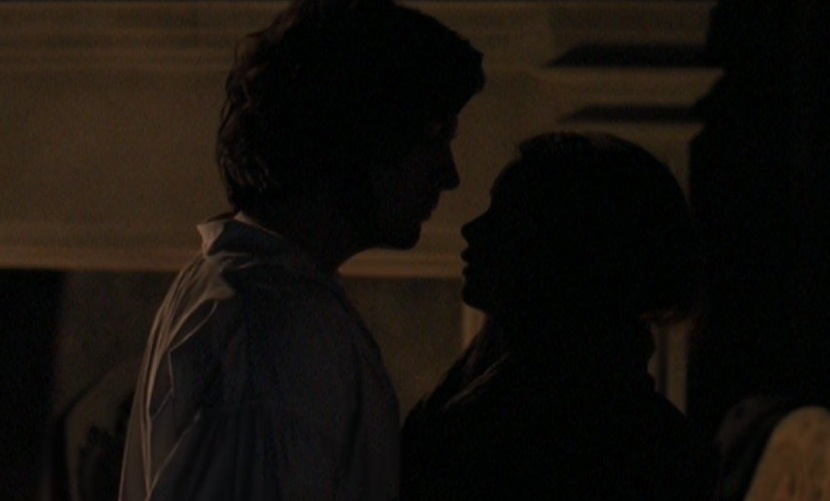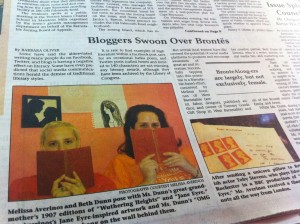
So BronteAlong is only one week old, and already we've been picking up quite a bit of steam!
It will not surprise you when I admit that I am an absolute sucker for an good gothic romance novel.
I grew up in a crumbling old Victorian house that was left to us by my great aunt. This bequest happily included all of her wonderfully moldering possessions -- and amid all the decorated blown egg shells and embroidered handkerchiefs and staffordshire china was one carefully preserved shelf of old, well-loved books.
Most of these were cheesy old stories of Cape Cod, which she collected avidly. But there was one row of tiny, red, leather-bound books. These books were her favorites.
I remember there were about twenty of these identically bound red books, each only about five inches tall and four inches wide, but the only titles I can remember from the set are MacBeth and Jane Eyre. Those were the ones that I read, over and over.
I went back to them after each brief infatuation with more modern authors, like Louisa May Alcott and Wilkie Collins. In my teens, I discovered old Harlequin romances -- not the modern ones with tumescent manhoods and heaving bosoms-- but the old titles from the 60's that held fast to the formula laid down in the best, the classic, Jane Eyre.
A young, poor, innocent girl on the verge of womanhood comes into contact with an older man who is rude/mean/beastly to her. It soon emerges that he has a dark past that torments him. TORMENTS HIM.
He realizes that only she can save him from the demons that haunt him. He realizes this only AFTER he has somehow managed to permanently alienate her, either by seeming to be in love with another, more worldly woman from his own class, or by some sort of profound amplification of said original beastliness.
Only when he has driven her away does he realize, IN ANGUISH, that he needs her.
This was it. This was the part that got me. When this moment of male anguish arrived, when I read that part of the story, the oddest thing would happen.
My palms would start to ache. No, throb. It kind of hurt.
An example:
My favorite old time Harlequin of all time was this utterly fantastic book called Devil in Disguise. It was awful, really, by which I mean AWESOME and desperately British and it is amazing that it was written as recently as 1981, so outdated are the characters and the stereotypes they represent.
The girl is named Clare, the man, Lazar. He's some sort of Greek shipping magnate. He abducts her to his Greek island in retribution for some supposed crime of her brother, Kip -- I think he was supposed to have defiled Lazar's sister, or something. So Lazar was going to do the same to Clare. And oh, I can't go on. IT'S JUST TOO AWFUL.
Of course he doesn't TOUCH her and then he falls in LOVE with her and is filled with SOUL-SEARING REMORSE and so he sends her packing back to ENGLAND where she pines away for him amid her pale, wan suitors named things like CLIVE and NEVILLE.
Then she decides to write him a Christmas card because that's what you do when someone ABDUCTS YOU WITH THE INTENT OF SEDUCING YOU. You add him to your Christmas card list. And sign it, very thoughtfully, Love, Clare.
So he comes sweeping back in from Thessalonika or wherever in his private jet and takes her back to his villa in Greece where he sits her down and very seriously -- ACHINGLY -- asks her if she meant what she wrote in her card.
Does she really love him?
At one point in the conversation she says something about how she was kind of afraid of him, you know, because of the whole abduction thing, and this PAINS him so that he has to turn his manly head away from her, corded muscles ridging his taut neck with the strain of it all. of having caused pain to the woman he loved.
I'm telling you, I read this book maybe fifty, sixty times.
And every time, when I got to the point where Lazar turns his head and weeps a manly tear, every single time, my palms would ache.
For. Real.
This brings me to tonight. Tonight I watched the latest Masterpiece Theatre, the fabulously gothic reproduction of Jane Eyre.
This is another, somewhat more respected piece of literature that is burned into my memory cells. And you know, bit for bit, plot element for plot element, I gotta say that those Harlequin authors owe a deep, deep debt to Miss Charlotte Bronte.
And like fucking clockwork, when that tormented soul Rochester raised his agonized eyes to poor sweet Jane and asked her if she believed in redemption -- again with the throbbing palms.
This raises several vital questions:
1. How did I ever grow up to eventually have enough feminist cred to enroll in a leading women's college?
2. How have I ever managed to have anything remotely approaching a normal relationship with a man, with these dark, shameful, as yet unfulfilled expectations lurking deep within my psyche?
3. What is this crap with the palms? Romantic stigmata?
Man, I sat down a few minutes ago with the simple intention of writing some thoughtful, mature review of the new Jane Eyre and how they had faithfully recreated the themes and motifs and all the other crap I learned in English lit at Mount Holyoke.
But I can't. My hands hurt.

So BronteAlong is only one week old, and already we've been picking up quite a bit of steam!

Melissa and I were delighted to be featured in The Barnstable Enterprise last week, essentially spotlighting our intense interest in the works of the Bronte sisters....